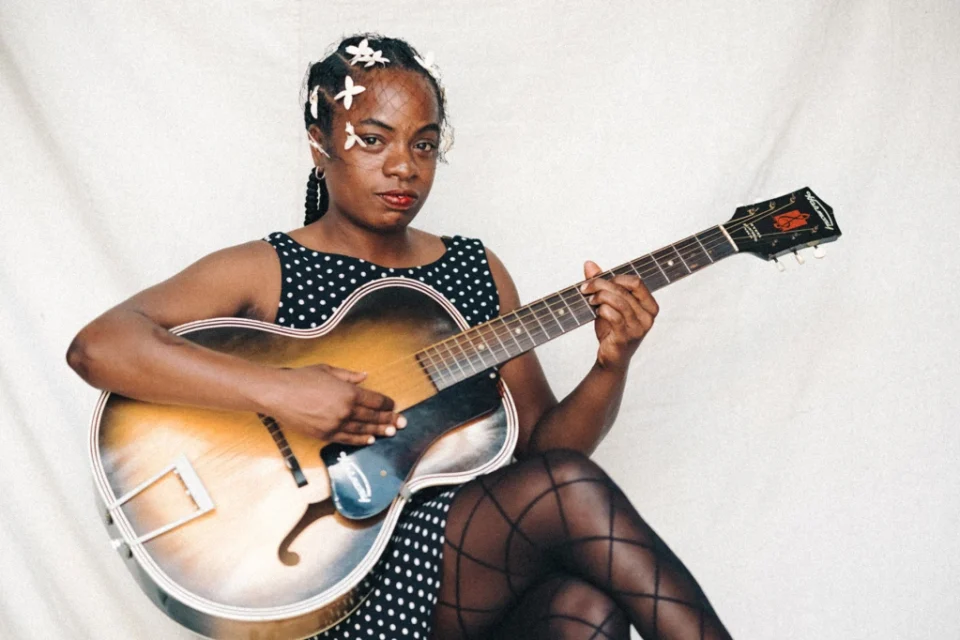Nashville-based singer-songwriter Sydney Ward, known as Sunny War, says there are two sides of her. One of them is very self-destructive and the other is trying to work with the other half to keep things balanced. From a devastating break-up and the loss of her father, the conflict of pain and preserving, the balance between a break-up album and an uplifting project, this became the theme for her fourth album Anarchist Gospel.
Ward was born in Nashville before moving to Los Angeles where she began to make music. Taking guitar lessons as a kid, she was inspired by AC/DC and Mötley Crüe before discovering bands like Bad Brains and The Minutemen. Although her music now blends folk, acoustic punk, and country blues, she started playing in the punk rock band Anus Kings.
She released her first solo album Worthless in 2014 followed by Red, White, and Blue in 2016. Despite doing what she loved, there were challenges along the way dealing with a rough childhood that would carry into her adult life. Her addiction to drugs and alcohol would land her in a sober living facility in Compton.
Despite the turmoil, she would continued to make music and released a series of albums and EPS including 2018’s With the Sun and 2021’s Simple Syrup and appeared in NPR Tiny Desk contest in 2019. She made the decision to move back to Nashville after a devastating break-up.
Packed with demos of several new songs, she returned to Nashville and signed with New West Records. She began working on the album with producer Andrija Tokic, who’s worked with Caitlin Rose, Hurray for the Riff Raff, Langhorne Slim and co-produced Alabama Shakes’ debut album Boys and Girls.
“I liked Andrija’s records, and I didn’t know I had a bunch of his records already, it just made sense to me,” Ward says. “I think he understands bouncing the tape and the digital. I wanted it to sound old, but I also wanted it to sound new. I think he’s good at that.”
Although her small backing band provided the raw energy, the primary instrument on the songs became her voice and the voices of the small choir of singers that acted as angels and demons on her shoulders. Those singers consisted of Allison Russell, David Rawlings, Jim James, and Chris Pierce, also her partner in War and Pierce.
“When the singers did their parts, it just sounded like gospel to me,” she says. “But I couldn’t call it that because it’s not religious, so I just felt like it was anarchist gospel.”
Between heartbreak and news about her father, she says this album represents a crazy period in her life, and the songwriting on this album became therapeutic.
“It was kind of scary, because I didn’t realize how sad I was until after writing the songs,” she says. “I guess it was therapeutic, but it also made me think, ‘Maybe I should seek help,’ after reading the songs back. Because I was like, ‘This is just getting kind of dark.’ I was just alone writing and being really depressed.”
The song “No Reason” speaks to the theme throughout this album discussing the internal struggles of someone trying to the best version themselves.
“I was trying hard to be good,” she says. “But I also was thinking about how it’s impossible and maybe that’s everybody, but maybe not, I don’t know. I think some people are great and perfect. So, it’s for people who aren’t perfect.”
She also reimagined the song “Hopeless” by Dionne Farris, which also featured on soundtrack to the 1997 romantic/drama Love Jones, with the help of Pierce and Russell who also feature on the opening track “Love’s Death Bed.” Another cover on the album is Ween’s 1994 song “Baby Bitch,” a playful break-up song featuring a choir of kids.
Every song on this record has a special meaning behind it, although some songs are harder to listen back to than others. Although she likes the song “I Got No Fight,” it represents a time in her life she never wants to go back to.
“I was really feeling emo that day,” she says. “So, I feel embarrassed if I hear it now. I just think around that time, I was feeling too dramatic right there.”
Healing can be a long process, but after those times of writing alone and making this record, she has finally reached a better place.
“I think it was just the amount of time it took to deal with what I was dealing with,” she says. “Also just trying to heal instead of what I was doing at first, just getting drunk and trying to ignore everything.”
“When I took a break from that, and was just actively like, ‘I’m only going to go on a walk and I’m just going to think about stuff.’ Now I feel a lot better just because I’ve been reading and learning how to process stuff. That’s why when I hear “I Got No Fight” now I feel embarrassed because I feel like it’s already been a year since then and nowhere near feeling like that.”
This album is the balance between good and bad. It represents someone’s story through the worst parts of life, but also follows the story of someone preserving. Sunny War’s vulnerability on Anarchist Gospel is bold and brave, but for her it was needed to be the process of healing.

